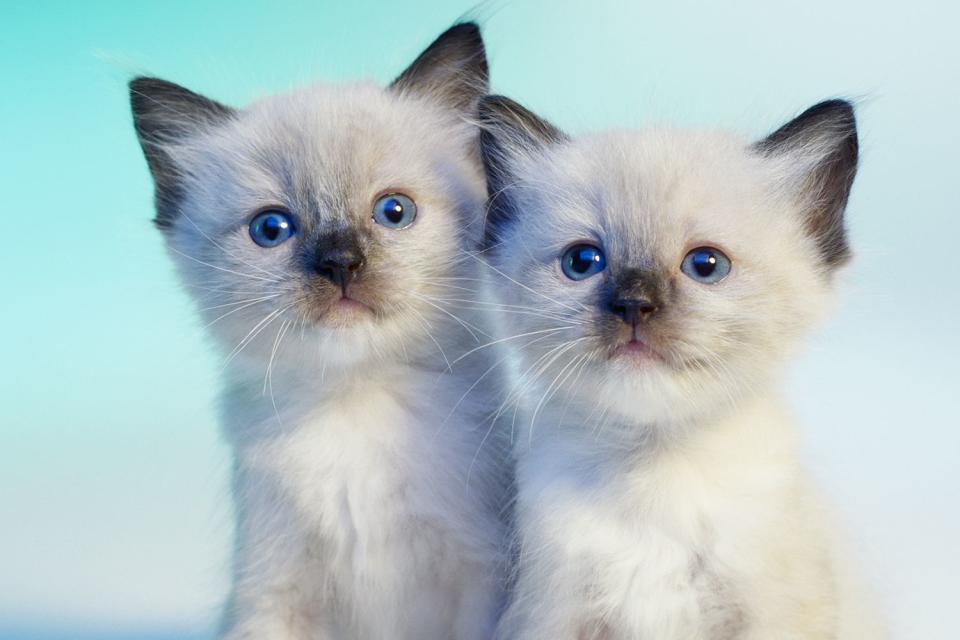Woman Receives 2 Clones of Her Late Cat for $50,000 After 2 Failed Attempts to Copy the Pet
A woman in Canada has two new ragdoll kittens after a Texas biotech company successfully cloned her now-deceased cat

GK Hart/Vikki Hart/Getty
A stock photo of two ragdoll kittensA Canadian woman has successfully cloned her beloved ragdoll cat twice — but the process came at a high cost.
Kris Stewart first attempted to clone her feline in February 2022, one month after her beloved cat Bear died at five years old in a traffic accident, per CTV News. Now, two failed cloning attempts and $50,000 later; the Vancouver-area woman has two new kittens that are genetic clones of Bear — Bear Bear and Honey Bear.
"I just felt like there was more living that needed to be done by Bear," Stewart told CBC.
"Bear was the smartest animal I think I've ever had, and I've had animals since I was two years old," she said before adding that she was "thrilled" with her brand new kittens, who are already showing similarities to her Bear.
"They both seem like Bear," Stewart shared with CBC. "These guys are bold and sassy."
Stewart began the cloning process by sending Bear's DNA to the Texas-based company ViaGen Pets, which specializes in pet cloning.
Related: North Carolina Couple Pays $25K to Clone Pet Cat: 'We Never Really Thought Much About the Cost'
On ViaGen's website, the company explains that their process for cloning felines involves using a cat's DNA to create a genetic twin of it by placing an embryo containing the DNA inside a surrogate cat, who gives birth to the cloned kitten.
"Cat cloning does not change the genetic make-up of your cat and does not involve any genetic modification," per ViaGen's site. "Your cloned cat will share many of the most important attributes of your current cat, including appearance, intelligence, and temperament."
Stewart said she did four embryo transfers using Bear's DNA, which led to two failed cloning attempts before Bear Bear and Honey Bear were born.
Never miss a story — sign up for PEOPLE's free daily newsletter to stay up-to-date on the best of what PEOPLE has to offer, from celebrity news to compelling human interest stories.
"... Cloning cats apparently does take some time. It's not uncommon to have multiple tries to make sure that the embryos can successfully grow into fetuses and become kittens," Stewart told CTV in 2023, after two attempts to place Bear's cell in a surrogate cat. "... Cats, apparently, are harder to clone than dogs and horses. So I just keep my patience."
ViaGen told the Canadian outlet that the biotech company has over 1,000 customers worldwide, including Canada. This isn't the company's first cat-cloning success, either — in 2019, North Carolina couple Bryan and Ashley Bullerdick paid $25,000 to clone their cat Cinnabun.
Related: Triple Trouble? Scientists Create Adorable Re-cloned Puppies from Original Canine Clone
Some pet owners who spend their earnings on cloning were inspired by Barbra Streisand, who chose to work with ViaGen to clone her late dog, Samantha.
"I didn't know it was possible until I read the article," Bryan told SWNS back in 2019.
"We never really thought much about the cost," he added. "It is a lot of money, but I know people who spend that on vacations all the time. This is an animal that we hope will be with us for two decades."
Last year, Stewart told CTV that cost wasn't a worry when it came to her pets.
"So I just think an animal that smart that gave me so much joy should be replicated. And that's what cloning is," she said. "Call me a poor money manager, but when it comes to the care and well-being of my pets, I just don't even put dollar signs in front of it."
Other creatures have also been the subject of cloning — in 2021, ViaGen helped to clone a black-footed ferret, marking the first time an endangered species in the U.S. has been cloned.
Domestic pet owners — including horse lovers — can pay ViaGen anywhere from $1,000 to begin the "genetic preservation" process, according to the company.
For more People news, make sure to sign up for our newsletter!
Read the original article on People.


